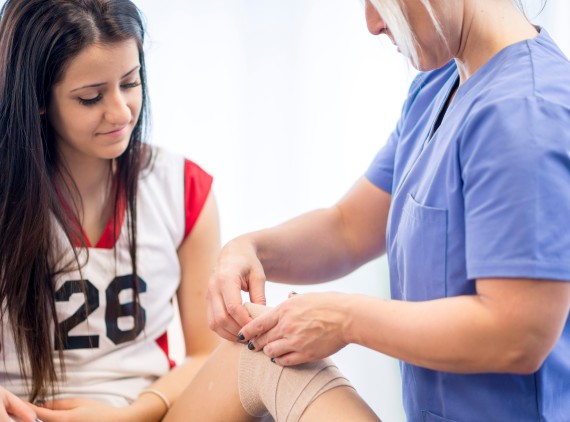One of the most important things that competitive youth athletes need to be aware of is that overtraining can lead to overuse injuries. By following tips from Phoenix Children’s, young athletes can be better prepared to prevent overuse injuries that could keep them out of the game.
The Sports Medicine team at Phoenix Children’s works with youth athletes to prevent and treat simple to complex injuries from head to toe including sports-related concussions and injuries of the neck, shoulder, back, hip, knee, ankle and foot.
Understanding overuse injuries
Overuse injuries happen when athletes overwork muscles and tissues in the body. Repetitive running, jumping, throwing or kicking can cause microscopic injuries, also called microtraumas. When you’re active, small tears in muscle fibers and soft tissues can occur. Without adequate time to heal, microtraumas can get worse and cause weakness, inflammation and pain. The risk of acute injuries such as sprains or strains may also increase.
Warning signs of overuse: When to take a break or seek help
“I often speak to patients who have ramped up their training schedule or intensity too quickly,” said Phoenix Children’s Sports Physical Therapist Kristina Lee. “I emphasize it’s better to progressively build up the body to limit overuse and injury risk. The longer overtraining goes on, the more time it will take to rest, heal and recover.”
Warning signs of overuse injuries include:
- Pain that increases while playing and continues when resting
- Pain in one specific area
- Playing or walking with a limp
- Pain that doesn’t stop within two to three days
- Pain that becomes intolerable
Whenever young athletes have pain that doesn’t go away within the first three days, they should have the injury evaluated by a medical professional. Families can contact our Sports Medicine team to schedule an appointment.
How to protect growing athletes
Growth spurts, softer bones and developmental changes can put kids at risk for overuse injuries. Sports physical therapists at Phoenix Children’s encourage parents, coaches and athletes to follow these tips to help prevent overuse injuries:
- Set realistic goals on and off the field
- Ensure the player, family, coaches, medical practitioners and personal trainers are working together with shared goals
- Learn proper lifting, stretching and training exercise techniques
- Be aware of overuse warning signs and properly rest versus playing through pain
- Practice proper sleep hygiene to optimize sleep quality
- Ensure the player is getting adequate nutrition and hydration for peak performance
How sports physical therapy can help
Effective training is a balancing act. Depending on the sport, providers may recommend different types of training and conditioning in-season versus during the off-season.
Stretching is extremely important for young athletes. Our sports physical therapists teach proper techniques that young athletes can use, including pre-game and post-game routines. By taking care of their bodies, they can stay active year-round.
“We consider other sports played and things like sleep, eating habits and school demands that affect your ability to recover and rest,” said Kristina. “Overtraining affects performance, but if it goes on, it can affect anything from mood to diets to how young athletes feel about themselves.”
Recognizing overuse risks can help prevent problems. The best training plans fit personal goals and lifestyles. Some youth athletes may benefit from relaxing bedtime yoga, while other kids may benefit from phone apps and tech devices that can motivate them to pace their progress. Workable routines help active youth athletes play their best while staying as healthy, happy and injury-free as possible.
If your young athlete develops an overuse injury, we recommend contacting the experts at Phoenix Children’s Sports Medicine. If needed, Phoenix Children’s offers sports physical therapy so overuse injuries don’t become worse.
“For our youth athletes who are recovering from overuse injuries, we teach active rest, stretches and safe ways to modify activities. Coming into sports physical therapy for guidance about how to do that is important for athletes and their families,” said Kristina.
To learn more or to make an appointment, call 602-933-3033 or visit Phoenix Children’s Sports Medicine Program.

